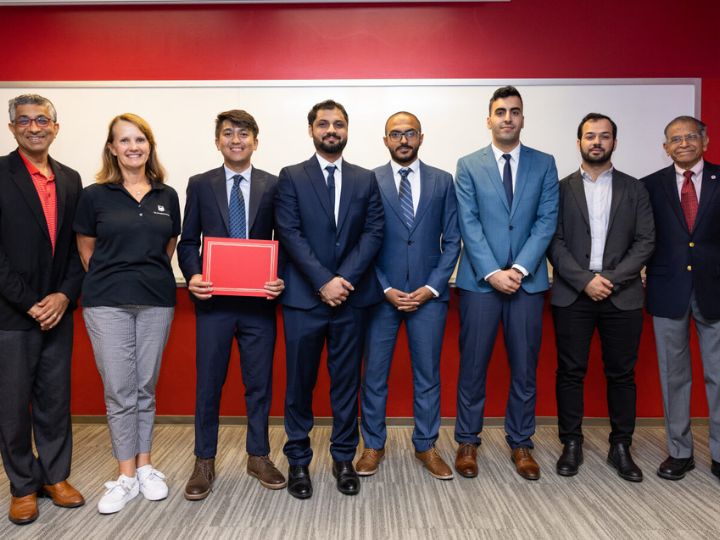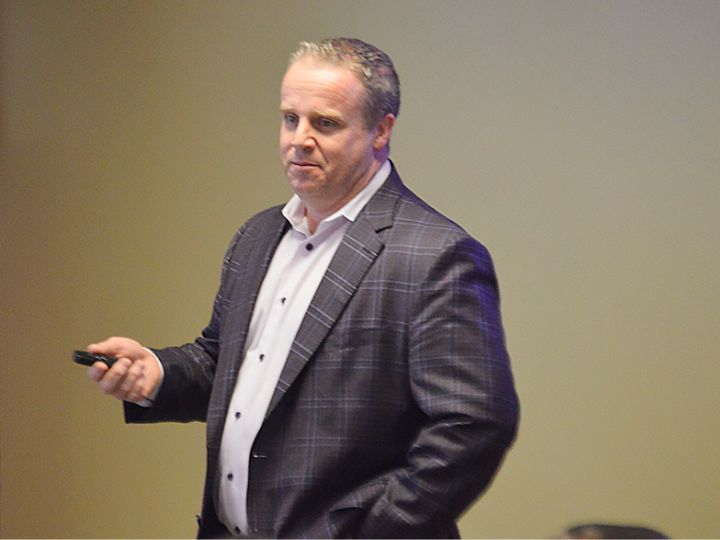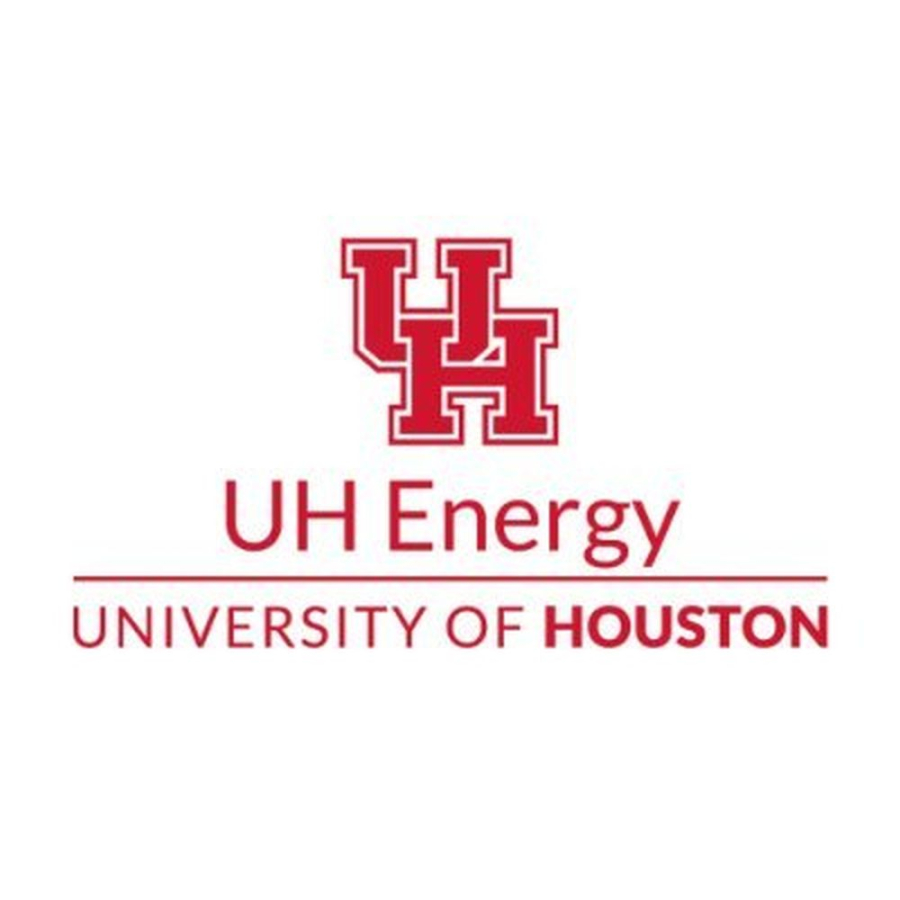The world is full of good ideas, but only some of them become viable and real.
“You don’t see the full impact of a good idea until someone figures out a way to convert it to a usable product or service that has value, brings it to market and makes money off of it – this is what makes it a sustainable business,” said S. Radhakrishnan, a retired University of Houston business professor and coordinator of UH Energy’s Innovation Commercialization Competition. “To have a successful energy transition, we need many innovative ideas to be commercialized.”
Keeping this in mind, Radhakrishnan worked hard to grow the second annual Energy Innovation Commercialization Competition – from five teams last year to 18 competing teams this year. The competition was open to graduate students from different disciplines working on a broad range of energy-related research across the UH System.
After judges whittled the entries down to five finalists, the teams pitched their findings to a final panel of volunteer judges representing Houston’s dynamic energy industry. The final presentations covered everything from carbon capture, carbon sequestration and lithium extraction from geothermal operations.
Two winners were selected:
ECHO: UH-Chevron Energy Transition Energy Innovation Challenge Winner.

From L to R: Dr. Ramanan Krishnamoorti with UH, Liz Schwarze of Chevron, with Prince Aleta, Ahmad Hassan, Abdelrahman Refaie, Mohsen Afshari of the ECHO Team, faculty advisor Mim Rahimi and Dr. S. Radhakrishnanand coordinator of UH Energy’s Innovation Commercialization Competition.
The ECHO team, made up of four UH environmental engineering doctoral students – Prince Aleta, Ahmad Hassan, Mohsen Afshari and Abdelrahman Refale and advised by Mim Rahimi, assistant professor of environmental engineering at the UH Cullen College of Engineering, won the first UH Energy Innovation Commercialization Competition. The team pitched a novel technology called ECHO, which is short for Electrochemical CO2 Harvester from the Ocean. It employs a membrane-less electrochemical process fueled by renewable energy to harness the ocean’s natural carbon dioxide absorption capacity to capture carbon dioxide efficiently and sustainably. This innovation seamlessly integrates with existing seawater intake infrastructure, offering a proactive approach to reducing carbon dioxide emissions from marine industries.
GeOME Analytics: Overall Energy Winner – UH Energy Innovation Challenge Winner

Marcus Phillips, vice president of GeOME, presenting.
GeOME Analytics, led by Preethi Gunaratne, Moores Professor of Biology and Biochemistry at the UH College of Natural Sciences and Mathematics, is a UH startup. The team pitched a field-portable genomics-based approach to reservoir drainage diagnostics for the oil and gas industry. GeOM E Analytics has established a field-tested platform that extracts and integrates personalized DNA biomarkers from multiple pads to provide metrics for upstream asset development. GeOME uses the technology to monitor fields during the full production cycles to predict drainage heights, percentage contributions, as well as well-to-well and pad-to-pad communication.
Gunaratne, director of UH Sequencing and Gene Editing Core, is the co-founder, president and more at GeOME. Other team members include Marcus Phillips, vice president; postdoctoral researchers Partha Bhagavanthula and Nuwan Acharige; and UH graduate students – Micah Castillo, Dishan Adhikari and Shiyanth Thevasagayampillai.
“We have been excited about this technology, because from the very beginning we felt it had a lot of potential,” said Prince Aleta, a civil and environmental engineering doctoral student and member of the ECHO team. “It’s a very serious issue as far as the need to capture carbon to achieve our climate goals, so we really pushed for it.”
For Ahmad Hassan, a fellow doctoral student and team member, the competition was eye-opening – not only from a business sense but also as a confidence boost.
“As we’re from the STEM field, we normally work in lab environments, and I hear people say that what we’re working on has less commercial value and that it would take ages for them to commercialize,” Hassan said. “This gave us the confidence and motivation to move forward.”
He hopes the team’s experience and success inspires other students.
UH Vice President for Energy and Innovation Ramanan Krishnamoorti said this competition not only influences the future of energy, but also redefines the benchmark for brilliance at UH.
“At the University of Houston, we are preparing future leaders and innovators by enabling them to transform the global energy ecosystem with ideas and technologies that are not only cutting-edge and innovative but also valuable to society,” Krishnamoorti said. “We must vividly demonstrate the transformative power of their actions and the power of learning by doing. This competition does that.”
The ECHO team won a $25,000 award from Chevron that will help continue their quest toward commercializing their research.
“The technology that was on display was fascinating,” said Liz Schwarze, vice president of global exploration for Chevron Corp. and sponsor of this year’s competition. “I’m optimistic we can continue to grow this program, because it’s all about creating a culture where we can pursue our scientific and engineering dreams while partnering with business and entrepreneurship along the way to spinoff value to our community faster.”
The other finalists:
- Team LiQuidium – Pranjal Sheth, Parisa Taheri, Erin Picton; advised by civil and environmental engineering professor Devin Shaffer. Their presentation focused on lithium extraction from geothermal brines.
- Aldrogen – Massiagbe Diabate and Bharat Bohara; advised by electrical and computer engineering professor Harish Krishnamoorthy and engineering technology professor Jian Shi. Their pitch centered on an A.I.-powered solution to improving grid resiliency while reducing emissions.
- MacAlgae – Mahsa Alian; advised by biotechnology professor Venkatesh Balan and mechanical engineering professor Zhu Weihang. This project displayed an environmentally conscious method of mycelium production.
UH Energy, an umbrella for all University of Houston’s energy-related initiatives and programs, focuses on encouraging academic contributions for the energy transition in three distinct areas: research, innovation and education. Part of that effort involves fostering opportunities for students to contribute new solutions to address key issues in energy.
UH, a Carnegie-designated Tier One Research University, encourages students at all levels to engage in innovative and meaningful research. It is this relentless commitment to student success, cutting-edge research and real-world impact that is driving the University closer to realizing its vision of becoming a top 50 public university in the nation.
